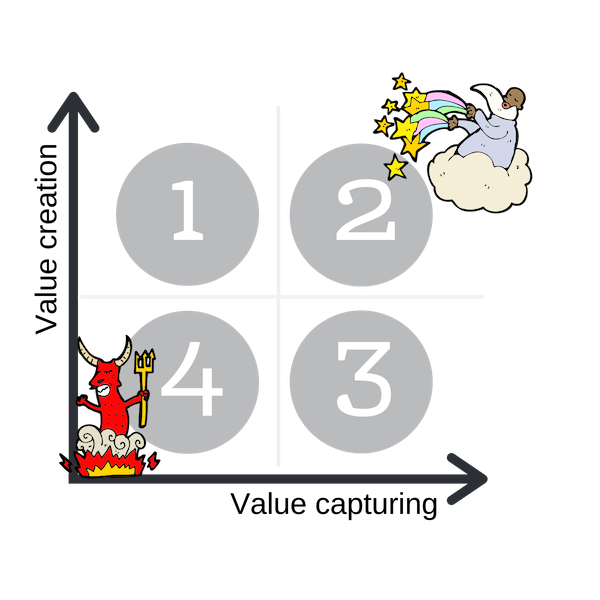We were recently debating the Value Creation – Value Capturing framework* (or VC2 for short) and its applications on specific organisations.

The framework is a compelling tool to use to describe strategic challenges and accomplishments of organisations.
The framework has two axes. On the y-axis it measures value creation (perceived value to the customer), on the x-axis value capturing (generating sufficient revenue and profits for the shareholders).
In the upper left-hand quadrant (1) we have companies with a good, or even great, product or offering, but who are unable to capture the value that it creates for their customers. Moving on to the upper right quadrant we come to heaven (2). This is the fabled kingdom of riches and plenty, of Apple and Amazon, where companies are at the forefront of innovation and development and customers are ready to pay for the value it creates for them. What often happens after some time in heaven is that companies start getting too comfortable and lazy in their blissful state. Slowly they fall from heaven and land in the lower right hand corner (3). The company is still making money, because your less alert customers haven’t noticed that you aren’t moving forward anymore, but before too long, you will find yourself in hell (4). A place where the money is gone, your best people have left you and your product or service no longer stands up to the competition.
Most organisations presumably want to go to heaven. This is why we stock up on all the management bibles we can get our hands on, and the reason we listen to the most influential missionaries, telling us how to get through those magic heavenly gates guarded by Steve Jobs and his apostles.
But while discussing this very useful and helpful framework over a cup of coffee, the following question popped up: where is the individual in all of this? The person working in the company? Someone dared to ask: “Do people exist to enable the company to get into “heaven”, or is it the purpose of the organisation to enable the individual to enjoy a meaningful and interesting (work) life?”. Is the organisation creating value only for the customer and the shareholders, or could it also be a platform for personal growth and development?
My personal definition of “organisational heaven” is a place (or a network?) where I can learn and develop, where I am challenged to push myself outside my comfort zone and where my network is large and diverse, feeding me with new ideas and insights and giving me feedback on the ideas I bring forward. At the same time, there has to be a high level of trust and psychological safety, which is the reason I dare to extend myself outside my known limits, dare to speak out the crazy ideas that could be the next important innovations.
Is my description of heaven a utopian fantasy without connection to the realities of working life? Or could there be a way these two versions of heaven can meet?
We might have a picture in our minds of how it is to work in a Heaven inc. -company. Work at this company is an endless parade of cool projects, brainstorming sessions in playful meeting rooms equipped with jungle drums and bouncy castles, working alongside amazing, inspiring, award winning colleagues. But it could also be the opposite. You could be working in Heaven inc. and still be feeling demotivated, overworked, harassed, wing clipped and drained of energy. Company success is not always translated into job satisfaction and meaningful jobs for the individual.
What many of the heaven-companies have in common is that they are working at the forefront of development. They are scoping new territories, developing new technology, new experiences or otherwise disrupting old markets. They are doing something completely new and unknown. This requires development, and developing new ideas requires learning.
Learning, in my opinion, is good for both the company and the individual. Learning is the force that pushes the organisation out of the burning flames of hell and towards the glory days of heaven. And learning, with all that it requires and what it gives back in return, is what makes work enjoyable for the individual. Organisational heaven, then, could be a place where companies give individuals the freedom and trust to develop new ideas freely. And in turn, these individuals will keep the organisation moving forward, creating real value for the customer and essentially helping make more sense of the world.
*) Verdin, Paul & Tackx, Koen: Are you creating or capturing value? A dynamic framework for sustainable strategy, M-RCBG Associate Working Paper Series No. 36, Harvard Kennedy School, 2015.

